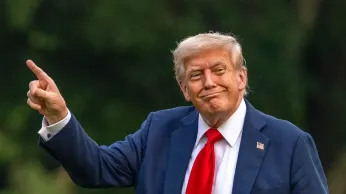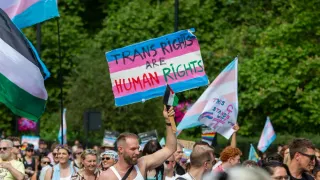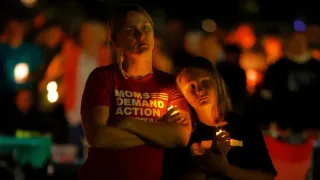
8 hours ago
‘I Love the Gays’: Trump’s Hollow Praise Clashes with Track Record
READ TIME: 3 MIN.
A recently published feature by The New York Times titled “Donald Trump’s Big Gay Government” has ignited widespread discussion after it reported an anecdote from an unnamed government associate, recalling President Donald Trump’s views on LGBTQ+ policy in the lead-up to his second presidential campaign. According to the source, when pressed on issues such as marriage equality, Trump allegedly responded: “I love the gays. They pay the most for the weddings.” The comment, while echoing Trump’s characteristic irreverence, has been interpreted by many as both grim and emblematic of his administration’s approach to LGBTQ+ rights .
The report arrives at a time when the Trump administration’s second term has been defined by a raft of policy changes that critics say directly undermine the rights and welfare of LGBTQ+ people. These include rollbacks on nondiscrimination protections, attempts to ban transgender people from military service, and support for conservative legislative efforts targeting LGBTQ+ communities .
Since returning to the White House, President Trump’s administration has enacted or supported several policies widely regarded as detrimental to LGBTQ+ rights:
- Military Ban: The administration has defended and sought to expand restrictions on transgender people serving openly in the US military, despite widespread condemnation from advocacy organizations .
- Healthcare Protections: Rules protecting LGBTQ+ people from discrimination in healthcare settings have been weakened or rescinded, affecting access to care, particularly for transgender people .
- Federal Agency Guidance: Departments including Education and Justice have reversed Obama-era guidance safeguarding LGBTQ+ students and workers, prompting lawsuits and protests .
These measures have been justified by administration officials as efforts to “protect religious freedom” or “restore local control,” but have been overwhelmingly criticized by LGBTQ+ advocates as regressive and harmful .
LGBTQ+ organizations and public figures reacted swiftly to the New York Times report. Many described the “I love the gays” remark as indicative of a transactional view of LGBTQ+ Americans, reducing their lives and relationships to economic stereotypes rather than recognizing their full humanity .
Sarah Kate Ellis, president of GLAAD, stated: “The LGBTQ+ community is not a punchline, and our rights are not up for auction. Comments like these, on top of years of anti-LGBTQ+ policies, show utter disregard for our dignity and equality” .
Social media platforms saw the comment trending under hashtags such as #LGBTQRights and #NotYourPunchline. Many users noted the disconnect between Trump’s purported support and his administration’s documented efforts to curtail LGBTQ+ protections .
The New York Times feature highlighted the presence of several prominent gay Republican men in the Trump administration, suggesting an “open secret” of LGBTQ+ individuals playing key roles in federal government. However, critics argue that representation alone does not equate to progress, particularly when policy outcomes negatively affect the broader community .
Political scientist Dr. Lisa Maldonado, interviewed by NPR, noted: “Visibility in government can be empowering, but not if it serves to mask or justify harmful policies. The lived experience of LGBTQ+ people across the US is shaped more by legal protections and social acceptance than by who is in the room” .
The controversy arrives alongside the unveiling of “Project 2025,” a conservative policy blueprint outlining priorities for a hypothetical second Trump term. LGBTQ+ advocates warn that this document contains proposals to further erode equality, from restricting access to affirming healthcare to rolling back federal protections .
Legal experts stress that such policy frameworks, if enacted, could have lasting impacts on the safety, health, and rights of LGBTQ+ people across the country .
In response to these developments, advocacy organizations are ramping up efforts to mobilize voters, raise awareness, and offer support to those affected by policy changes. Campaigns are focusing on the importance of legal protections, the dangers of discriminatory rhetoric, and the value of inclusive representation that advances—not undermines—equality .
As the 2026 midterm elections approach, LGBTQ+ issues remain a focal point in national debates. Community leaders emphasize the need for ongoing vigilance, solidarity, and advocacy to ensure that the rights of all people—regardless of sexual orientation or gender identity—are respected and protected .






